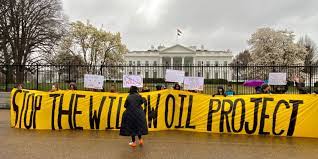Biden Breaks Environmental Protection Promises

March 27, 2023
During the 2020 Election Campaign, President Biden promised that he would end new gas and oil drilling projects on public lands. He vowed that he would remain strong to the large corporations that wanted rights to these lands in order to cut down on fossil fuels and work towards a cleaner, more environmentally friendly future. On the 13th of March, he shattered that promise by giving formal approval for Project Willow. This project is a proposal by ConocoPhillips aimed at gaining access to a region of the federal oil land reserve roughly the size of the state of Indiana. The $8 billion project has sparked outrage among environmentalists and Americans concerned about the current climate crisis, leading to over a million letters being sent to the White House asking to block the proposal, all of which have been evidently ignored.
This project is an ecological disaster. By approving this project, President Biden has allowed the project to, by its own estimations, release 9.2 million tons of carbon pollution per year. Biden was well aware of this fact, and he ceded victory to the oil companies by moving to approve the project.
“Joe Biden knows there is no greater challenge facing our country and our world. That’s why he is outlining a bold plan – a Clean Energy Revolution – to address this grave threat and lead the world in addressing the climate emergency.” This quote comes directly from President Biden’s campaign website, but where is this bold plan? Where is the clean energy revolution or his actions to address the global climate crisis? The only action taken by Biden was his work to launch the Global Methane Pledge at the 2021 UN Climate Summit, but yet again, it is only a promise that has no actual physical value. The United States, among dozens of other countries, has continually “promised” to work towards a better future, and yet we still find nearly every single one of these nations heavily dependent on fossil fuels and the companies that profit off of them.
These continuous promises to cut these emissions by collective groups of nations have a long history of not working. The Paris Agreement, by almost all factors, has exceedingly failed. Its predecessor, the Kyoto Protocol, was seen as even more of a failure. We have tried time and time again to vote in favor of those who claim to be champions of climate advocacy, and yet we have seen so little progress for decades.
This long line of failed promises has continued since the very discovery of the climate crisis and has led all the way up to today, where we watch as Biden breaks the promise he made in his campaign.
Regardless, let’s look at the reasons why Biden believed the project was necessary for America. Most importantly, the growing separation between America and foreign oil exporters continues to grow, with rifts in diplomacy between the US and countries like Saudi Arabia, Venezuela, and Nigeria all drifting towards Russian and Chinese influence. The BRICS alliance (Brazil, Russia, India, China, and South Africa) is an economic alliance between these nations made in an effort to curb American dominance in the global market, and most recently, Saudi Arabia and Iran, two oil giants, have expressed interest in joining the organization. This threat leaves America almost isolated in oil resources, and, despite having huge reserves of our own, it still represents difficulties in obtaining oil in the future. Biden evidently views the project as an option to create American oil independence even further than what we currently have.
In addition, Biden sees the project as an opportunity to facilitate the energy transition into clean energy. Finally, the administration was under legal restraints that would not allow for them to fully block the project, as the company had lease rights to the land from several years ago.
However, the majority of these decisions are inaccuracies at best. As for the rising BRICS oil threat, most of our oil doesn’t even come from these countries. In fact, the majority (59%) of our oil imports come from our direct neighbors, Canada and Mexico. (EIA) These oil powers only make up roughly 13-20%. The rest of that oil comes from dozens of countries, many of which are US allies economically and politically.
For the goal of furthering the energy transition, further perpetuating the crisis through the production of even more oil resources with an excuse to use the money to broaden our economy simply doesn’t add up. While it may soften the blow on our economy, it will only further increase the amount of time actually necessary to fix the ecological disasters occurring on our planet.
Working for a solution that is meant to slowly lay these massive oil corporations’ rest is not what the people need. We need affirmative and strong action that will allow our nation to work toward a cleaner and safer environment for future generations. The sheer amount of inaction in addition to the willingness to fully participate in the destruction of our environment by our politicians is disgraceful. Many will say that doing your part to help keep the world clean is enough, but the truth is that these companies, especially those involved in the oil industry, are by far the leading cause of the crisis more than any amount of average people.






